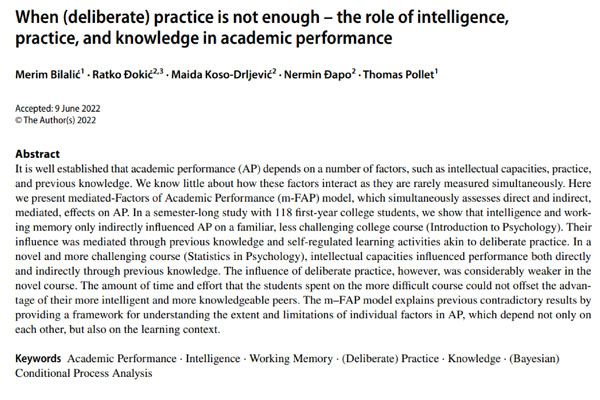Notifications list
When (deliberate) practice is not enough – the role of intelligence, practice, and knowledge in academic performance
Published: 13.07.2022.

Merim Bilalić, Ratko Đokić, Maida Koso-Drljević, Nermin Đapo and Thomas Pollet are the authors of the original scientific paper titled When (deliberate) practice is not enough – the role of intelligence, practice, and knowledge in academic performance. The paper was published in “Current Psychology“, indexed in Q2 for Psychology in the Scopus base (2021).
It is well established that academic performance (AP) depends on a number of factors, such as intellectual capacities, practice, and previous knowledge. We know little about how these factors interact as they are rarely measured simultaneously. Here are presented mediated-Factors of Academic Performance (m-FAP) model, which simultaneously assesses direct and indirect, mediated, effects on AP. In a semester-long study with 118 first-year college students, the authors showed that intelligence and working memory only indirectly influenced AP on a familiar, less challenging college course (Introduction to Psychology). Their influence was mediated through previous knowledge and self-regulated learning activities akin to deliberate practice. In a novel and more challenging course (Statistics in Psychology), intellectual capacities influenced performance both directly and indirectly through previous knowledge. The influence of deliberate practice, however, was considerably weaker in the novel course. The amount of time and effort that the students spent on the more difficult course could not offset the advantage of their more intelligent and more knowledgeable peers. The m–FAP model explains previous contradictory results by providing a framework for understanding the extent and limitations of individual factors in AP, which depend not only on each other, but also on the learning context.
The paper is available in open access at the link: http://idiprints.knjiznica.idi.hr/1024/.
